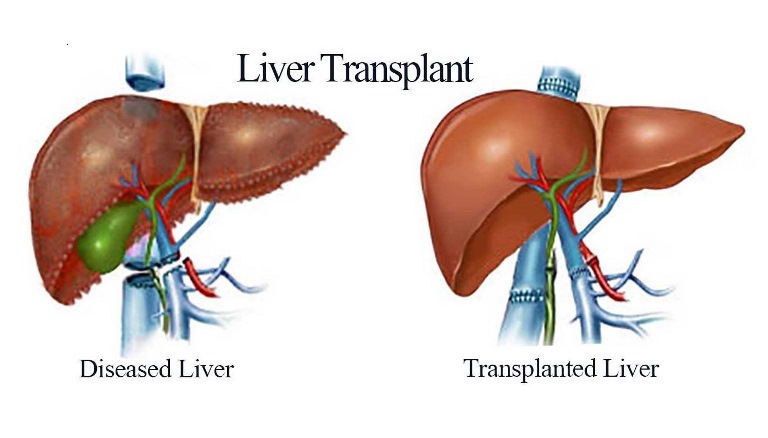Liver Transplant Cost In India

Liver Transplants has been one of the successful innovations in the healthcare industry over the last five decades. Now, this medical therapy is currently in its golden age in India on account of the number of surgical procedures and the newest improvements that arose over the past couple of decades. Connect to our specialist for the affordable liver transplant cost in India.
The very first successful living donor liver transplant alongside a dead pig liver transplant occurred in November 1998 after several unsuccessful attempts. With an innovative increase in the health care field, there have been 1,200 liver transplant package in 2014 itself.
Together with these figures and Indian medical employees keeping abreast of the newest developments in the health care sector, India has become one of their preferred medical tourism destinations for individuals around the world.
Liver Transplant:
A liver transplant also called a hepatic transplant, would be that the replacement of a diseased liver with a healthy one given by someone else. Being a real remedy to adrenal liver disorder or severe liver failure, it includes a whole lot of many added benefits.
Whenever you have a liver disorder without a medical treatment being successful, then you might qualify for a liver transplant. When a candidate suffers from some of the next liver ailments:
- Hepatitis B
- Hepatitis C
- Alcoholic liver disease
- Fatty liver disorder or Non-alcoholic steatohepatitis
- Autoimmune hepatitis
- Wilson’s disease
- Formerly failed liver transplant
- Polycystic disease
- Hemochromatosis
- Liver cancers
- Primary biliary cirrhosis
- Acute liver disease
- Afterward, he/she must undergo a liver transplant.
Different Types of Liver Transplants:
Greater than 80% of live donor liver transplants happen in India as compared to western states where roughly 90 percent of transplants are from dead donors.
Deceased Donor transplant:
– If the patient is brain dead, then he’s deemed dead along with his liver is about to be transplanted.
– After fitting the dead person’s blood number and dimensions, the liver has been transplanted into the needy person who comes on the waiting list.
– Since the liver has the power to regenerate, so, occasionally it’s divided into two parts and transplanted into two patients at once – a kid and an adult.
Liver Donor Transplant:
– If a lobe of the liver has been transplanted in a live donor to replace a diseased liver, then it’s a living donor transplant.
– The donor must be a direct relative for example parents, grandparents, children, grandparents, spouse.
– The liver regenerates/regrows to the regular dimensions and this procedure begins when the liver is divided/transplanted.
– It takes 2-3 weeks for the entire of their liver to regrow to its dimensions.
Requirements & Evaluation: Live Liver Donor:
Since the liver gift is organ donation, hence the donor and the receiver must adhere to the regulations and rules from the Indian authorities.
Only certified physicians possess the authority to run a liver transplant.
Cadaver transplants should be performed from brain dead men.
In the event of brain dead individual, if cells, both are to be eliminated, then it needs that the consent of their board of health care specialists prescribed by the Act and the Rules thereunder.
Live contribution from’near-relative’ ought to be invited more rather than non-near comparative.
A Coordination Committee is set up by the State Government to manage all transplant-related problems that require the existence of the parties.
If the donor is unrelated by blood, then there shouldn’t be any industrial angle supporting the contribution that’s eliminated by the consent committee appointed by the authorities.
Procedure
- Pre-Operative Evaluation Process For Liver Transplantation
- As liver transplantation is a large step, so, one must embrace a positive mindset before becoming treated. The test is a step-by-step procedure that starts with the receiver’s evaluation. When the individual is qualified for transplantation, the search for donors at the household starts based on their own blood collection.
- If the donor is located, it requires clearance from the consent committee to move farther and the transplantation generally goes in about 2-3 weeks.
Risks And Complications: Post-Liver Transplant Management
Out of risks and complications, there are two Big complications That Have to be Cared for and they’re:
1. Organ Rejection:
– The immune system attempts to attack the transplanted liver because it can’t distinguish between the transplanted liver and undesirable viruses and bacteria.
– greater than 30% of liver transplant patients undergo a certain level of organ rejection in the initial year.
– consequently, the physicians prescribe anti-rejection drugs or immunosuppressants to prevent organ rejection when the immune system attacks the transplanted organ.
2. Infection:
– Since the anti-rejection drugs suppress the immune system, liver transplant patients eventually become prone to ailments.
– Occasionally, these illnesses go away by themselves.
– a few patients don’t experience any disease in any way, whereas in other circumstances, infections are treated efficiently as they’re diagnosed.
What Factors Affect Liver Transplant Expenses?
There are lots of reasons that convince individuals to choose liver transplant costs in India for their medical care. Aside from the price gap, the standard of health care services is another motive.